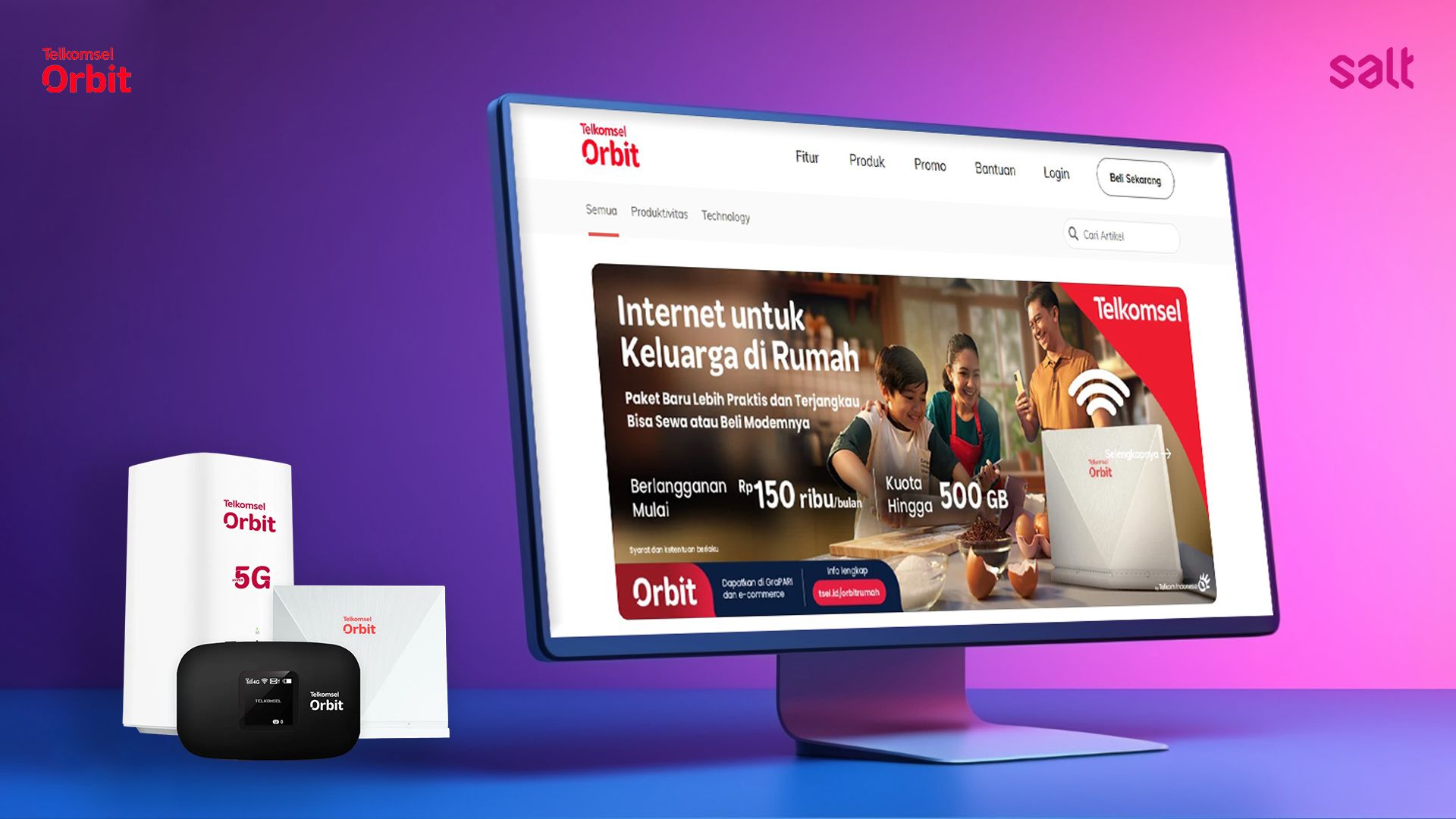Telkomsel Orbit, commonly known as MyOrbit, is an innovative home internet service that has successfully provided digital solutions to thousands of households across Indonesia. Behind this service's success lies a strategic effort to harness various technological opportunities while addressing challenges, particularly in transforming its technological infrastructure.
As Telkomsel's technology partner, SALT was key in delivering solutions through a Bespoke Technology Development approach, transforming MyOrbit's architecture from Monolithic to Microservices.
In this article, we’ll explore how the collaboration between SALT and Telkomsel led to significant changes in the development of MyOrbit through the implementation of Microservices, paving the way for faster, more efficient, and more stable innovation.
Facing the Challenges of MyOrbit's Monolithic Architecture
The collaboration between SALT and Telkomsel in developing MyOrbit began with the use of a Monolithic architecture, which was deemed sufficient at the time.
All the core components—from registration services to payment systems to user management—were integrated into a single large system. Initially, this approach enabled MyOrbit to operate smoothly as the home internet service gained recognition and grew.
However, as growth often brings new challenges, the larger MyOrbit became, the more its Monolithic architecture began to show its limitations.
A significant challenge emerged when even minor system updates necessitated a complete platform outage, impacting all website functionalities.
This affected the development process, slowed innovation, and had the potential to disrupt the user experience. Additionally, this process was time-consuming, costlier, and carried a high risk of downtime—a significant concern for a digital service like MyOrbit.
Over time, these challenges became more pronounced, and the need for a more flexible, efficient, and faster solution became urgent. This was the turning point when Telkomsel realized that to maintain MyOrbit's growth momentum, a technology architecture that could adapt to the evolving market and user demands was essential.
Monolithic to Microservices: The Solution for System's Scalability & Flexibility
Recognizing the challenges faced by Telkomsel Orbit, SALT offered a solution through the Transformation of Architecture from Monolithic to Microservices. This approach not only addressed the problems, but also provided a more robust and more flexible foundation to support sustainable innovation.
Microservices allowed every system component to be broken down into smaller services that could function independently. Each module, whether for registration, payment, or other features, no longer relied on the entire system but could be developed, tested, and updated independently.
This brought numerous benefits, making MyOrbit's development more dynamic and easier to manage. Below are some of the key advantages of this transformation:
- Modular Development
Each module or component within MyOrbit can now be managed separately. For example, the payment module can be developed and tested without affecting other modules like registration or platform exploration. This allows the team to release new features more quickly. - Minimal User Disruption
One of the biggest challenges of Monolithic architecture is service disruption during updates. With Microservices, MyOrbit users can continue enjoying uninterrupted service, even when the technical team performs development or maintenance behind the scenes. - Higher Stability
Microservices enable each feature to operate independently, meaning if one service encounters an issue, it won’t impact the performance of other services. This ensures platform-wide stability and delivers a better user experience. - More Efficient API Integration
SALT also optimized the API integration system within MyOrbit. Communication between services is now smoother and more efficient, allowing various modules to interact seamlessly without placing additional strain on the system. - Faster Deployment Process
With Microservices, new feature prototypes can be developed and deployed much faster. Deployment time can be reduced to less than 2 weeks, enabling the release of new features every month to meet market needs. This is crucial for keeping MyOrbit competitive in the home internet market. - More Structured Monitoring and Maintenance
Each component can now be monitored independently. This allows SALT's technical team to detect and resolve issues more quickly without waiting for the entire system to go down. This mechanism accelerates response time and increases overall system reliability.
Through the Microservices approach, Telkomsel Orbit not only gains greater flexibility, but also the ability to continuously innovate without being hindered by technical obstacles.
How MyOrbit Became Faster and More Efficient
The transformation from Monolithic architecture to Microservices significantly impacted the performance and efficiency of MyOrbit.
One of the main effects is the Improvement in Operational Efficiency. MyOrbit can now operate 24/7 without interruption, as each component can be updated and developed independently without shutting down the entire system.
In addition, with a more flexible development capability, Telkomsel Orbit can Optimize Time and Costs.
Before Microservices implementation, every change or fix required testing of the entire system, which took longer and incurred higher costs. Now, with microservices' modularity, changes are made only to the necessary parts, making the process faster and more cost-effective.
Moreover, Microservices also positively impact Telkomsel Orbit’s Revenue Stream. The system’s increased reliability and improved user experience boost customer loyalty, increasing the company’s revenue.
A Transformation that Redefines Digital Services
The transformation of MyOrbit’s architecture from Monolithic to Microservices, driven by SALT, proves that the right technology can revolutionize a service's evolution and operation.
Benefits such as improved efficiency, flexibility in development, and enhanced system stability demonstrate that Microservices are the future solution for technology companies that aim to innovate continuously.
The collaboration between SALT and Telkomsel Orbit in this case study not only addressed technical challenges, but also paved the way for MyOrbit to grow and evolve even further.
With this strong collaboration and commitment to innovation, let’s embrace the digital future together with SALT, guiding your business toward sustainable success.
Click the banner below to connect and start a fantastic transformation journey for your business!

